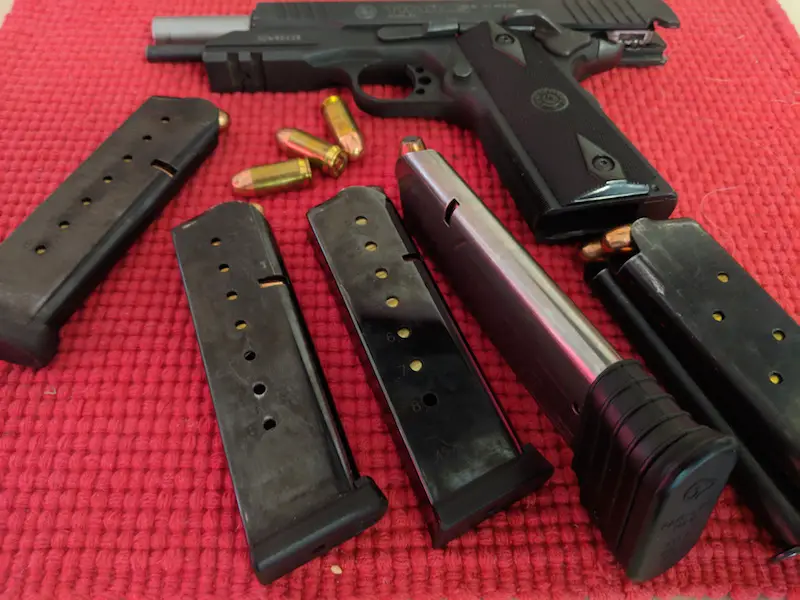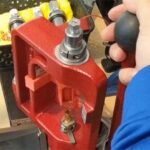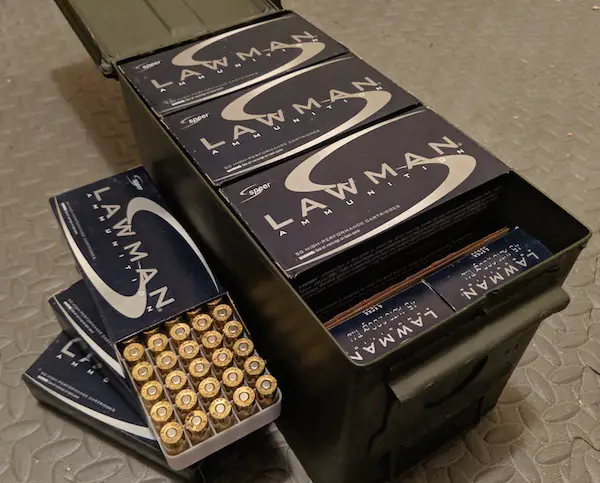A weapon is a machine, and machines can break down. You should do everything within your power to keep this from happening. This means regular maintenance of your everyday concealed carry handgun. Many people think only of the action of the weapon, and fail to realize that both the ammunition and magazine play a vital role. Because they fail to rotate ammo and maintain their magazines, they can become a point of failure when you need them most.
After clearing my weapon the other evening, I began to consider when the last time was that I cycled through my EDC ammo. This got me wondering how many people don’t ever change their ammo out. So, How often should you rotate everyday carry ammo? Any round in the chamber should be rotated quarterly, while magazine ammo should be done at least annually. I also recommend you rotate ammo in your revolver quarterly, because of the increased exposure of the rounds. This ammo can be converted from EDC to range ammunition. Rotating ammo regularly decreases the chances of corrosion buildup or exposure of the primers to gun oil.
Table of Contents
What Causes Ammunition To Go Bad?
The shelf life of modern ammunition depends on a number of factors. Most manufacturers claim that their ammo is good for 10 years. When kept under ideal conditions, the shelf life is likely much longer than this. However, those ideal conditions are nigh impossible to maintain. Let’s discuss what things can cause a weapons’ ammo to expire before it’s time.
Composition Of A Round
Before we get into the outside factors that can cause ammunition to go bad, let’s look at the parts of the round for a better understanding. A round is comprised of four major components. Those are the projectile, the casing, the powder, and the primer.
The projectile is composed of lead, while the casing is composed of brass. Modern-day powder is smokeless and the combustion of this material is what causes the bullet to be expelled from the gun. The primer is the catalyst for causing the powder to burn/explode. Alright, now that we know all of the working components lets see where breakdowns can occur in your ammunition.
Moisture
Moisture is one of the biggest enemies of your weapon. Continued exposure to moisture, can cause your weapon to corrode. Where firearms are concerned, this is more commonly known as rust. This chemical reaction breaks down the material ultimately leading to its demise. In order to prevent this, gun owners apply gun oil.
While neither the lead or the brass casing on a round will rust, they are both subject to corrosion. Corrosion occurs in the presence of moisture and oxygen.
Corrosion, in extreme cases, results in a nasty film covering the metal. Think about your car battery, as an example. You know that nasty light green, deposit on the top of the terminal, that’s corrosion. Corroded ammunition can cause ammunition to not feed properly or fail to fire (FTF). Generally speaking, moisture isn’t good for your gun, or ammo.
Also, moisture can affect the combustibility of your powder. Ever tried to start a fire in the rain? It’s the same concept with your ammunition. Having wet powder is not good, and it’s important to rotate ammo regularly to prevent corrosion buildup in your everyday carry firearm.
Excessive Gun Oil
Oiling your weapon on a regular basis protects the metal, and ensures the longevity of your everyday carry pistol. However, excessive oil can actually be a detriment to your ammunition. Using an excessive amount of oil means that it can transfer from the weapon to your ammo.
Firing a round depends on a series of events occurring. If your primer is rendered obsolete, then the powder will not ignite, and the projectile will fail to fire. Oil can cause your primer to fail.
When you over oil your weapon, you not only risk direct contact of the primer with the oil, but also the possibility that the powder could be exposed and be transferred to the primer. Rotate ammo regularly, to prevent primer failure.
Chambered Vs. Magazine Ammo
At this point, you may be wondering why there is a difference in time between the round you keep chambered and the rounds in your magazine. Assuming you maintain your weapon and oil regularly, the chambered round is at an increased risk of contamination.
It is far more likely that the round you keep chambered will have the primer exposed to oil. Because that round is isolated from the rounds in the magazine, the exposure to moisture and oxygen are increased. For these reasons, I recommend changing that round out every 3 months.
Similarly, the rounds in your magazine can also be exposed to outside elements. Any corrosion that occurs in the magazine can cause the rounds to not feed properly. These rounds are also at risk of having primers exposed to gun oil but are far less likely than the chambered round. Because of this, I recommend you rotate ammo in your magazines every 12 months.
However, because revolver ammunition is not contained within a magazine, the exposure to moisture and oil is increased. Ammunition can be exposed to oil not only from the weapon itself, but also residual oil that soaks into the holster. I recommend revolvers follow the same protocol as chambered rounds, and are cycled every 3 months.
Should I Leave My Magazines Loaded?
Obviously, rotating ammo is a concern. However, magazines should not be neglected. Should you keep your magazines loaded? The spring in your magazine deteriorates due to repeated compression and decompression. If your EDC pistol magazine is not used at the range, you’re likely alright to keep it loaded. However, if you do not have a dedicated magazine for this purpose, I recommend changing out every couple of years. Ideally, you will dedicate a magazine to EDC to avoid having to buy new ones.
How frequently you need to change your magazine for your EDC firearm will depend on how diligent you are with maintenance. Avid shooters will cycle ammo through magazines more frequently than someone who only uses their weapon as a means of protection, and doesn’t make it to the range often.
While I recommend a new magazine every couple of years, you can extend the life of your magazine in several ways. First, change the ammo at a set interval. Second, clean your magazine when you clean you rotate your ammo if you have a dedicated magazine. In the image at the top, the magazines on the left are my range magazines. The magazines on the right are my EDC mags.
Otherwise, clean your magazine whenever you clean your weapon. This ensures no buildup of debris that could hinder the magazine spring from working.
Parting Shots
Should you ever need your weapon, the last thing you will want is for your weapon to fail. Not only should you take every precaution to make sure your weapon is in working order, but also that your ammunition is not compromised. Changing the chambered round at a regular interval, and the subsequent rounds in your magazine help ensure optimal performance. Take care of your magazines as well. Because a great gun and clean rounds could mean nothing if your magazine fails to load a second round when you need it.
How often do you rotate your EDC ammo? Did I miss anything? Leave your comments below.










